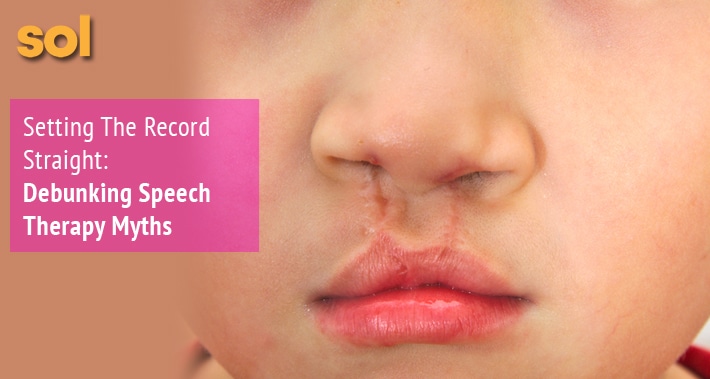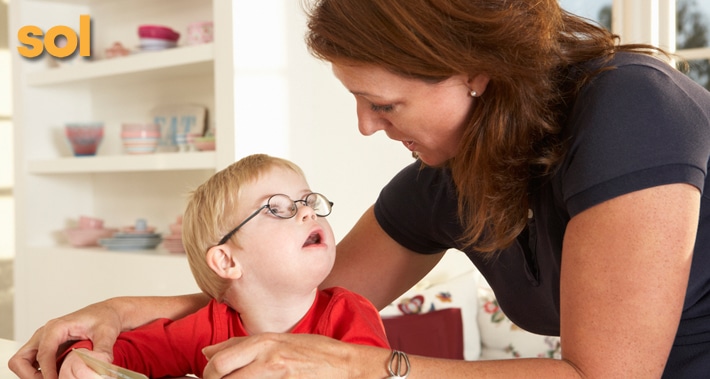
Have you been looking for a speech and language therapist but don’t know where to start?
Or are you curious about speech therapy but are hesitant to try it?
It’s possible that you might have heard myths about speech therapy, which makes you reluctant to try it, even if you think it might help.
In today’s world, there’s a lot of misinformation out there, and the speech therapy practice is not immune to it.
If you’re interested in speech therapy services but are hesitant or if you’ve heard about it and have more questions, the following article is for you.
Keep reading to learn more about some speech therapy myths you might have heard, and why they’re false.
Myth #1: Speech Therapists Only Help With Talking Problems
You might have heard that speech therapists only help with talking problems.
That might be understandable based on the name, but that’s why our formal name is actually speech language pathologist – because there’s more to us than speech.
While speech therapists can help with speech sounds, speech therapists are qualified to support you with all kinds of issues.
Why It’s False
Speech therapy can help you with a range of issues such as speech, language, social and cognitive-communication, and swallowing disorders.
Speech therapists have experience with speech and language issues related to the following conditions:
- ADD/ADHD
- Aphasia
- Autism spectrum disorder
- Childhood apraxia of speech
- Cluttering
- Craniofacial disorders like cleft palate
- Down syndrome
- Dysarthria
- Dyslexia
- Dysphagia
- Hearing loss
- Hypernasality
- Literacy issues (reading, writing, spelling)
- Resonance disorders
- Stroke recovery
- Stutter reduction treatments
- Teaching sign language
- Traumatic brain injury recovery
- Voice disorders
- And many more
As you can see from the list above, speech therapists have a wide skill set and can help with many more problems than just fixing speech sound errors.
Speech Therapists Only Help With Stuttering
Some people think that speech therapists can only help with stuttering.
While stuttering is a common problem that you might want to see a speech therapist for, it’s not the only problem a speech therapist can help with.
Why It’s False
It’s a misunderstanding that only individuals with lisps and stutters need speech therapy.
While lisping and stuttering are perhaps the most “famous” speech disorders requiring speech therapy, they are by no means the only ones.
There are actually many other speech and communication disorders a speech therapist can help with.
Speech therapy helps for a wide range of speech problems, many of which are listed in the previous section.
People with cleft palate may require speech therapy to improve their oral skills.
Likewise, people with dysphagia or difficulty swallowing may benefit from techniques taught by speech pathologists.
Kids Will Grow Out Of Their Speech Disorders
This is a common one that you might hear from your pediatrician.
And while it’s true that some children will sometimes grow out of a speech disorder, most of the time that’s not true.
When your child is learning to talk, it can be difficult to tell whether they have an actual speech or language disorder.
Why It’s False
Speech pathologists are knowledgeable about language development in children and can identify a speech delay or disorder faster than you can.
It’s always best to seek the help of a speech therapist if you have any concerns about your child’s speech and language development.
What can be even more damaging about this myth though, is the fact that early intervention speech therapy can sometimes greatly reduce or even eliminate a speech disorder entirely, if it’s caught at a young enough age.
But going by the “wait and see” approach can mean you miss the window of early intervention.
As a result, your child may be saddled with speech and language issues more intense than they would have.
This can also negatively impact school performance down the line.
If your child needs help, getting a speech therapist involved early on improves your child’s speech outcomes.
If it turns out that your child is already on the right track in their speech development, a pediatric speech therapist can let you know for your own peace of mind.

Kids Are More Likely To Develop A Speech Disorder If More Than One Language Is Spoken At Home
It’s a myth that children are more likely to have speech disorders if you speak more than one language at home.
Bilingual children are at no more risk of developing speech disorders than children who only speak one language.
Why It’s False
If you’re raising bilingual children, they might go through a period where they speak less.
This quiet period might worry you, but it doesn’t necessarily mean that your child has a speech disorder.
It’s usually because your child is processing two different languages and needs time to understand them both.
Don’t let concerns about your child developing a speech disorder stop you from speaking multiple languages at home.
If Your Child Has A Speech Or Language Disorder, It’s Your Fault
As a caregiver, you might feel responsible for everything in your child’s life.
It’s true that you are responsible for a lot, and raising a child isn’t easy.
But it’s not your fault if your child has a speech or language disorder.
Why It’s False
Speech disorders aren’t anybody’s fault.
There could be a biological reason why your child has a speech disorder, such as cleft palate, for example.
It could be genetic, and that they would have the disorder regardless of the environment they’re growing up in.
In limited cases, speech disorders can be linked with neglect during pregnancy or in the early years of their life, like in the case of fetal alcohol syndrome.
Beyond that, though, speech disorders are a natural part of life, and you shouldn’t blame yourself if your child has one.
Speech Therapy For Kids Is Just Play Time
Some people think that speech therapy isn’t helpful because it’s just playtime.
While speech therapy has aspects of play, this is to make the therapy work for the child.
Why It’s False
Speech therapy is more than play, it’s a treatment designed for children.
Playing comes naturally to children, and if the therapy doesn’t feel like work to them and can be integrated into a child’s regular routine, it will help them to succeed.
Playing and having fun promote the child’s full engagement in the session while giving you a model to replicate when you’re at home.
If You Have A Speech Or Language Disorder, There’s No Helping It
You might think that speech disorders are a lifelong problem that can never be improved or helped.
They can be long-term but with the right treatment with a speech therapist, they can be overcome.
Why It’s False
Speech and language disorders can be a challenge when you’re by yourself.
But, if you have a speech therapist who can help you and who is deeply knowledgeable about your particular condition, they can help you.
Book An Appointment With Sol Speech & Language Therapy
If after reading this article, you still have questions about speech therapy, get in touch with us.
We are happy to answer any questions you have about speech therapy and what is involved in the process.
We can also help you to understand what kind of speech therapy is best for you and your unique needs.
Book an appointment with us today.
6448 E Hwy 290 Suite E-108,
Austin, TX 78723
(512) 368-9488
» https://g.page/r/CfRfhOpEQm7BEAE
Sol Speech & Language Therapy
555 Round Rock W Dr E-221,
Round Rock, TX 78681
(512) 808-3953
» https://g.page/r/Cb5pwCTosSEfEBM
Sol Speech & Language Therapy offers personalized skilled intervention to those struggling with their speech and language skills. Services offered include screening, consultation, and comprehensive evaluation. We also provide one-on-one and/or group therapy for speech sound disorders, receptive/expressive language delay/disorder, stuttering/cluttering, accent reduction, and much more.